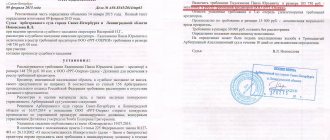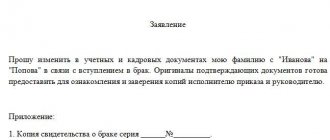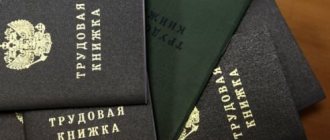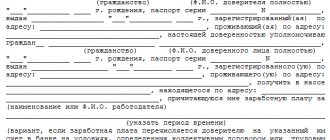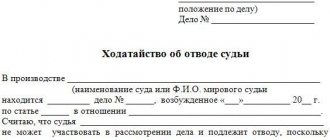Power of attorney for a car
A power of attorney for a car is a mandatory document for individuals using it without the presence of the owner. Despite the fact that on November 24, 2012, changes were made to the traffic rules that a driver driving a car in the absence of its owner is not obliged to transfer a power of attorney to drive a vehicle (vehicle) to traffic police inspectors for verification, but it is enough just to present the MTPL policy in which he inscribed However, this does not mean that the trustee should not have a power of attorney. In its absence, it will be impossible to get the vehicle from the impound lot; if it is evacuated, you will not be able to undergo technical inspection yourself and perform a number of other actions necessary for its full use.
In 2021, a power of attorney from an individual to drive a car, register with the traffic police and undergo a technical inspection does not require mandatory notarization. The vehicle owner only needs to fill out the required power of attorney form and sign it, after which the authorized person (the owner’s representative) has the right to independently:
- manage and dispose of the vehicle;
- insure;
- carry out transportation;
- carry out customs clearance;
- register with the traffic police;
- undergo technical inspection;
- receive a car from a parking lot;
- defend your rights in court after an accident.
Forms for such powers of attorney for a car can be downloaded on our website, and you can also see a sample of filling them out.
Rules for issuing a power of attorney
When registering a power of attorney, you must adhere to the following rules:
- indicate the date of issue and the validity period of the power of attorney (without indicating the date of issue, the power of attorney is considered invalid; without indicating the validity period of the power of attorney, it is valid for 1 year);
- when a car is owned by several individuals, everyone must appear as principals;
- The vehicle can be entrusted to several persons, the number of whom is not limited;
- The presence of an authorized person when drawing up a power of attorney is not necessary.
The power of attorney specifies:
- place and date of document preparation;
- Full name of the principal and the authorized representative;
- data of civil passports of the Russian Federation of the principal and the authorized person;
- residence addresses from the passport of the principal and the authorized representative;
- list of powers transferred to the authorized person;
- the possibility or impossibility of transferring powers;
main characteristics of the vehicle:
- brand;
- state registration number;
- VIN identification number;
- year of issue;
- engine number;
- body number;
- chassis number (if available);
vehicle passport (PTS):
- series;
- number;
- issued by whom and when.
Powers of attorney with the right to delegate powers, as well as with the right to sell a vehicle, must be certified by a notary, otherwise they are considered invalid.
Power of attorney form M2 sample filling (M-2a)
Filling out the front side
In order for the document to be valid, the power of attorney must be filled out correctly. Filling out starts from the upper right corner - indicate the classifier codes of your organization and its name. The next number of the power of attorney, the date of preparation and the period of its validity are indicated. Please note that without the specified completion date, the document will be considered invalid.
According to current legislation, the period for using a power of attorney can be up to three years. If a product is obtained from one supplier for a long time, then in practice quite often they limit the validity of the document to shorter periods, for example, they issue it for a month, during which an updated copy is provided. However, you can choose other dates. If you have a one-time power of attorney, then indicate shorter periods, usually from a week to two, since the removal of goods and materials usually occurs during this period.
The document must also indicate other information about the organization:
- The name of the consumer, in this case, is the name of the organization that issues the document.
- Data about the payer, if this is the same, then the data about the organization is duplicated, or an entry is made - “He is the same”.
- Postal address of the organization.
Below is the information about the employee for whom the power of attorney to receive the goods is issued:
- His position.
- Full Name.
- Details of the identity document (passport) – series, number, when and by whom it was issued, date of receipt.
Please note that inventory items will be issued to your employee only if the passport information and the data recorded in the document match when these papers are presented to the counterparty.
At the end of the front side, fill in from whom the goods and materials and the document are received, for example, the invoice number and its date: “Invoice No. 216 dated 05.11.2015.” On the reverse side, information about those inventory items that the employee is to receive is filled in.
Filling the reverse side
The reverse side of the paper is needed to indicate all the necessary information about those inventory items that the employee needs to receive under this document. The table contains the following information:
- Number in order.
- Name of values.
- The number of specified inventory items and their unit of measurement. The quantity column must be filled out in words, since the numbers can be added if desired. If there is an empty space in the column after filling, then the remainder is crossed out. If there are empty lines in the column, they must also be crossed out. You can cross out each line, or draw the letter “Z” in the remaining space so that it covers all the remaining empty space.
Next, the employee must put his signature, only after this the document is certified by the chief accountant and the head of the organization. If an employee is handed a document drawn up according to Form No. M-2, then he must also sign for receipt on the spine, and if according to Form M-2a, then in the journal for issuing powers of attorney.
If for any reason an employee does not use the power of attorney issued to him, then immediately after its expiration date it is handed over to the accounting department, and the entry “not used” is made on the counterfoil or in the accounting journal. The document must be kept until the end of the current year with the responsible person.
The detachable spine contains information about the validity period of the power of attorney, its number, the employee who accepted it (full name and position), as well as information about the date of receipt of the inventory and materials and the supporting document.
Representing the interests of the company, a citizen must be endowed with appropriate powers. According to clause 1, the authority of an individual to act on behalf of an organization may be based on:
- act of an authorized government body;
- indication of the law (for example, a manager - the general director - can act on behalf of an LLC without confirmation of authority);
- written authority, which is a power of attorney.
These rules apply to all cases of economic life. For example, when receiving goods from a supplier, a company representative must have a power of attorney to receive material assets. A power of attorney is required to confirm the authority of the representative. If it is absent, the transaction may be declared invalid in court. The supplier will not be able to prove the fact of transfer of the goods, therefore, it will be difficult for him to prove the right to receive payment.
An organization can independently develop a power of attorney to receive inventory items or use unified forms M-2 and M-2a, approved by the State Statistics Committee in Resolution No. 71a dated October 30, 1997. Below you can see a power of attorney to receive material assets and see an example of how to fill it out.
Power of attorney forms
All proposed power of attorney forms are valid in 2021 and are available for free download in the following formats: PDF - for manual filling, as well as Word (docx) - for manual filling and entering data from a PC keyboard.
Files with the PDF extension can be opened and printed using browsers: Chrome, Explorer, Edge, etc., as well as using programs: Acrobat Reader, PDF-XChange Viewer, PDF Viewer Plus, Soda PDF, etc., which can be found and downloaded for free on the Internet.
Power of attorney to drive a car (vehicle)
The form is filled out and certified by the owner of the vehicle (an individual) without a notary to transfer the following powers to his representative:
- driving license,
- passing technical inspection,
- receiving a vehicle from a parking lot,
- registration of an MTPL policy,
- representing the interests of the owner in the traffic police,
- handling the case in court after an accident.
The maximum validity period of a power of attorney is three years (36 months).
Sample power of attorney form for a car
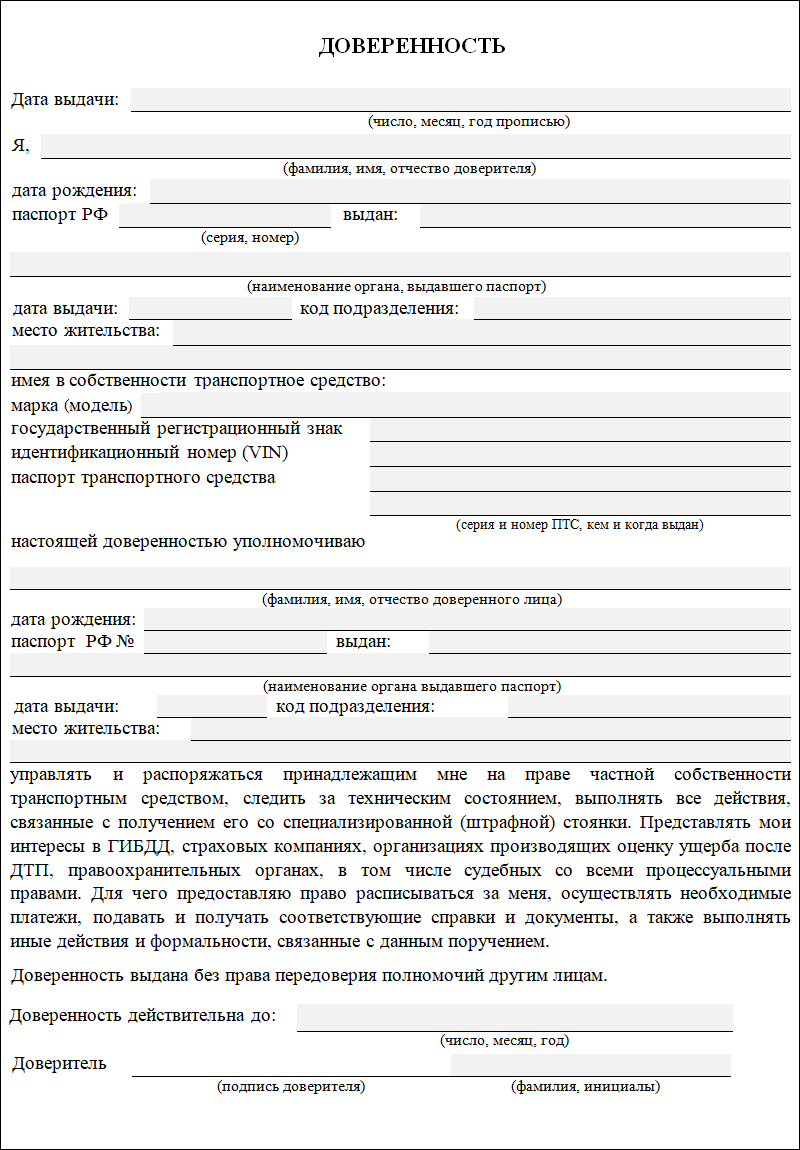
Power of attorney for vehicle registration
A power of attorney form for registering a car (vehicle) with the State Traffic Safety Inspectorate and obtaining state license plates is filled out and certified by the owner of the vehicle (an individual) without a notary to transfer authority to his representative. This power of attorney form includes fields for filling out the data of the purchase and sale agreement, so it is advisable to use it after purchasing a vehicle.
The validity period of the power of attorney cannot exceed one year (12 months). The document is printed in 2 copies: one for submission to the traffic police, the second for the representative of the vehicle owner.
Sample form of power of attorney for vehicle registration
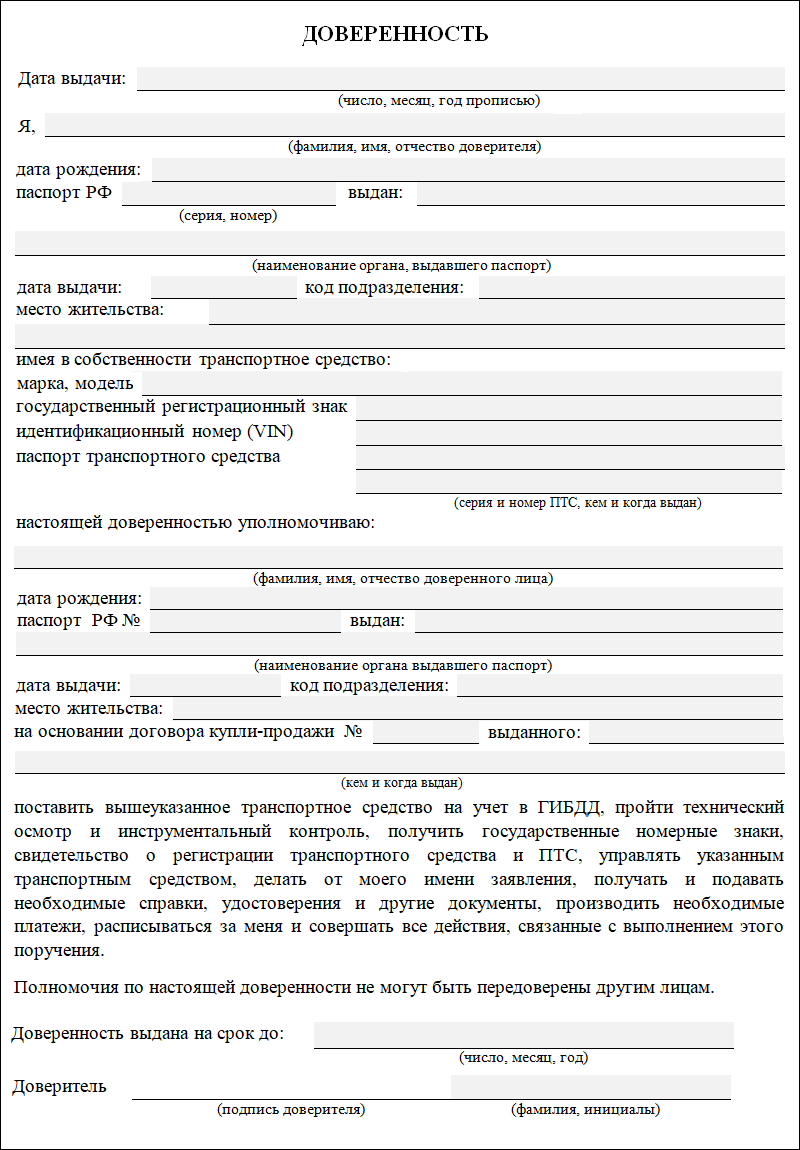
Power of attorney to perform registration actions
A power of attorney form for any registration actions with the traffic police with a vehicle (does not include fields with the data of the purchase and sale agreement) - filled out and certified by the owner of the vehicle (an individual) without a notary to transfer the following powers to his representative:
- driving license,
- car registration license,
- obtaining a registration certificate and PTS,
- obtaining state license plates,
- changes in registration data,
- termination of registration,
- registration and deregistration,
- appeals against non-fulfillment or improper performance of official duties by officials.
The validity period of the power of attorney cannot exceed one year (12 months). The document is printed in 2 copies: one for submission to the traffic police, the second for the representative of the vehicle owner.
Sample form of power of attorney to perform registration actions in the traffic police
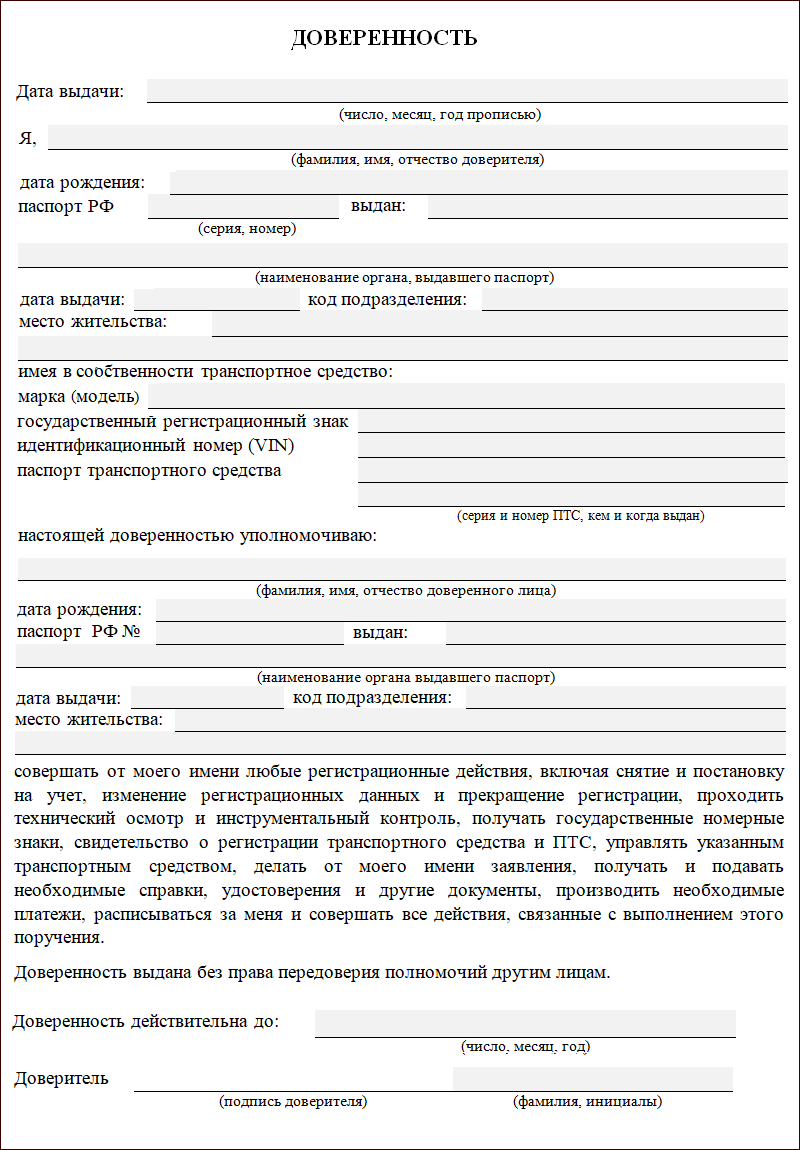
We create our own form
If you use your own form, the power of attorney must contain the required details:
- name of the document - power of attorney;
- date of issue;
- Details of the principal (organization that issued the document): OGRN may not be indicated, the name, address and TIN are sufficient;
- representative details: full name, passport details, place of residence (the representative must have a passport with him to prove compliance);
- The powers granted must be indicated (list of goods and materials received and details of the supplier);
- signature of the representative;
- signature of the manager and seal of the company that issued the document.
Any validity period for the power of attorney can be specified, but, according to , unless otherwise specified, the document remains valid for a year from the date of issue. A power of attorney can be issued to any person: an employee of the organization and a citizen who is not an employee.
Sample filling
To correctly and error-free fill out the power of attorney form, please read the example of how to fill it out.
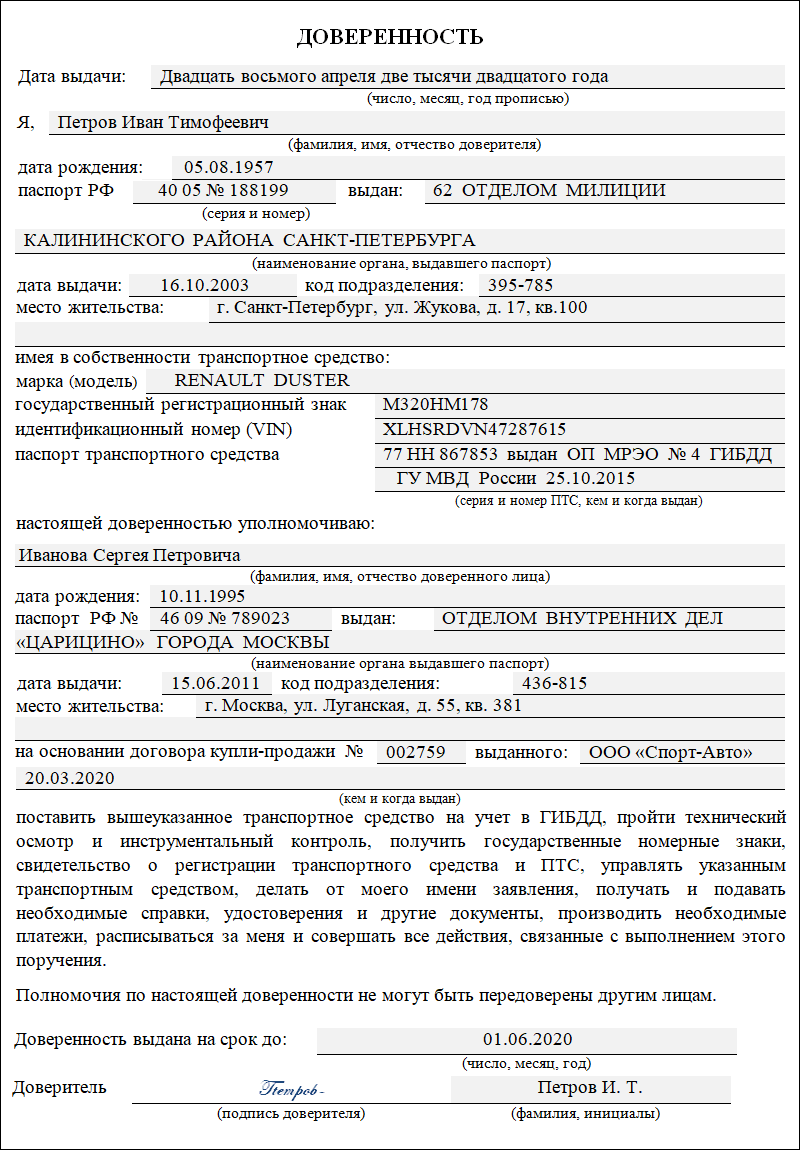
General power of attorney
A general power of attorney, whose role can be either an individual or a legal entity, gives the maximum authority to a representative of the owner of a vehicle. Such a power of attorney requires notarization and is issued when selling or exchanging a vehicle, or when donating it to a certain person. The number of persons participating in transactions under a general power of attorney is not limited by law. A power of attorney can be issued to one or several persons, as well as from one or more persons.
A general power of attorney transfers the right to use a vehicle for a temporary period, but does not record the fact of purchase, sale or donation. At the same time, the principal retains the right to resell or transfer the vehicle to a third party, which must be recorded in a general power of attorney. When concluding a purchase and sale transaction, the buyer must be aware of the rights to the vehicle being acquired. A general power of attorney also does not cancel the right to transfer property by inheritance of its legal owner (principal), even in the event of the death of the principal and the trustee. In this case, the vehicle becomes the property of the relatives of its owner. The maximum validity period of a general power of attorney for a car (vehicle) is three years, and if it is not specified, the document will be valid only for one year.
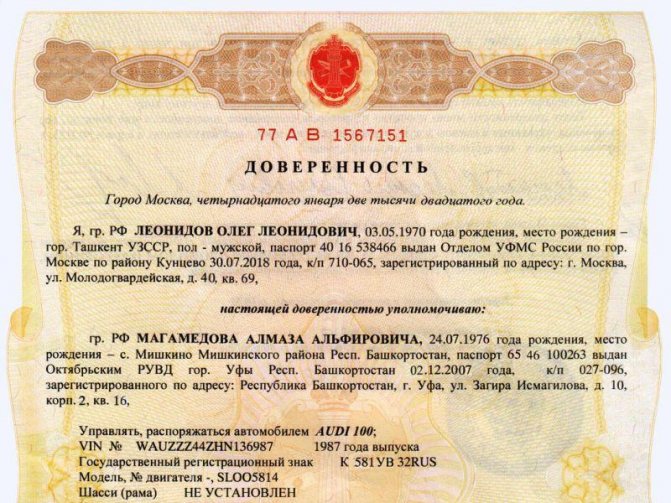
To issue a general power of attorney, the owner of the vehicle, together with the individual to whom he wants to transfer his powers, needs to come to a notary office with Russian passports and documents for the vehicle, where experienced operators will legally compile it and print it out on company letterhead, and the notary will perform the appropriate notarial actions. All you have to do is pay for their services, where the cost of technical and legal work for individuals is approximately 800 rubles, and together with certification by a notary - 1200 rubles.
1.4. Rules for issuing a power of attorney
A power of attorney is drawn up in writing and in some cases requires mandatory certification by a notary. Thus, the following are subject to notarization:
· powers of attorney for transactions requiring notarial form;
· powers of attorney to submit applications for state registration of rights or transactions;
· powers of attorney to dispose of rights registered in state registers;
· powers of attorney issued by substitution ;
· irrevocable powers of attorney;
· cancellation of notarized powers of attorney.
In addition, the law equates to notarized powers of attorney :
1) powers of attorney of military personnel and other persons undergoing treatment in hospitals, sanatoriums and other military medical institutions, which are certified by the head of such an institution, his deputy for medical affairs, and in their absence, the senior or duty doctor;
2) powers of attorney of military personnel, and at points of deployment of military units, formations, institutions and military educational institutions, where there are no notary offices and other bodies performing notarial acts, also powers of attorney of employees, members of their families and family members of military personnel, which are certified by the commander (chief ) these units, formations, institutions or establishments;
3) powers of attorney of persons in places of deprivation of liberty, which are certified by the head of the corresponding place of deprivation of liberty;
4) powers of attorney of adult capable citizens living in stationary social service organizations, which are certified by the administration of this organization or the head (his deputy) of the relevant social protection body.
A power of attorney to receive wages and other payments related to labor relations, to receive remuneration for authors and inventors, pensions, benefits and scholarships, or to receive correspondence, with the exception of valuable correspondence, can be certified by the organization in which the principal works or studies, and by the administration inpatient medical institution where he is being treated. Such a power of attorney is certified free of charge.
Before performing a notarial act to certify a power of attorney, a notary in accordance with Art. 16 Fundamentals of the legislation of the Russian Federation on notaries explains to the applicant for a power of attorney the legal consequences of issuing a power of attorney in order to avoid any abuses and violations of the rights and legally protected interests of each party.
Before performing a notarial act, the notary establishes the identity of the person applying, checks the legal capacity of the citizen and the legal capacity of the legal entity, the powers of the representative of the legal entity in accordance with the constituent documents.
The identity of Russian citizens is established by a passport or other identity document that replaces a passport. The identity of Russian citizens permanently residing abroad and arriving in the Russian Federation for temporary residence is established using their general foreign passports. The identity of foreign citizens living on the territory of the Russian Federation is established by passport, as well as by another document established by federal law or recognized by an international treaty.
The legal capacity of a legal entity arises from the moment information about its creation is entered into the unified state register of legal entities and terminates when information about its termination is entered into the said register. A power of attorney on behalf of a legal entity is issued signed by its head or another person authorized to do so in accordance with the law and constituent documents.
When certifying a power of attorney, the notary explains to the represented the right to provide in the power of attorney the possibility of sub-assignment by the representative of the powers transferred to him under this power of attorney, as well as subsequent sub-assignment. In addition, the notary explains to the represented his right to cancel the power of attorney and the procedure for its cancellation.
The notary enters information about notarized powers of attorney (in particular about the person who certified the power of attorney, the date of certification of the power of attorney, its registration number in the register of notarial acts, the date and time of entering information about the cancellation of the power of attorney in the event that the power of attorney is cancelled) into the Unified Notary Information System . This information forms a public register of powers of attorney , to which free and direct access is provided to an unlimited number of persons without charging a fee using the Internet information and telecommunications network every day and around the clock.
Thanks to this online service, citizens can obtain reliable legal information about all powers of attorney executed and revoked by a notary. written authority granted by one person to another person to complete a transaction with a third party; a person on whose behalf a power of attorney is made; an official authorized by the state who has the right to perform notarial acts on behalf of the Russian Federation in the interests of Russian citizens and organizations (legal entities); the ability of a citizen to own through actions, acquire and exercise civil rights, create civil responsibilities for oneself and fulfill them. The capacity and legal capacity of a citizen are mandatory for his participation in civil legal relations. Legal capacity arises in full upon reaching the age of majority – 18 years. Until a person reaches the age of eighteen, legal capacity is acquired through marriage and emancipation. the ability of a person, enshrined in law, to have legal rights and bear legal responsibilities, which is recognized equally for all citizens. The legal capacity of a citizen arises at the moment of his birth and ends with death.



